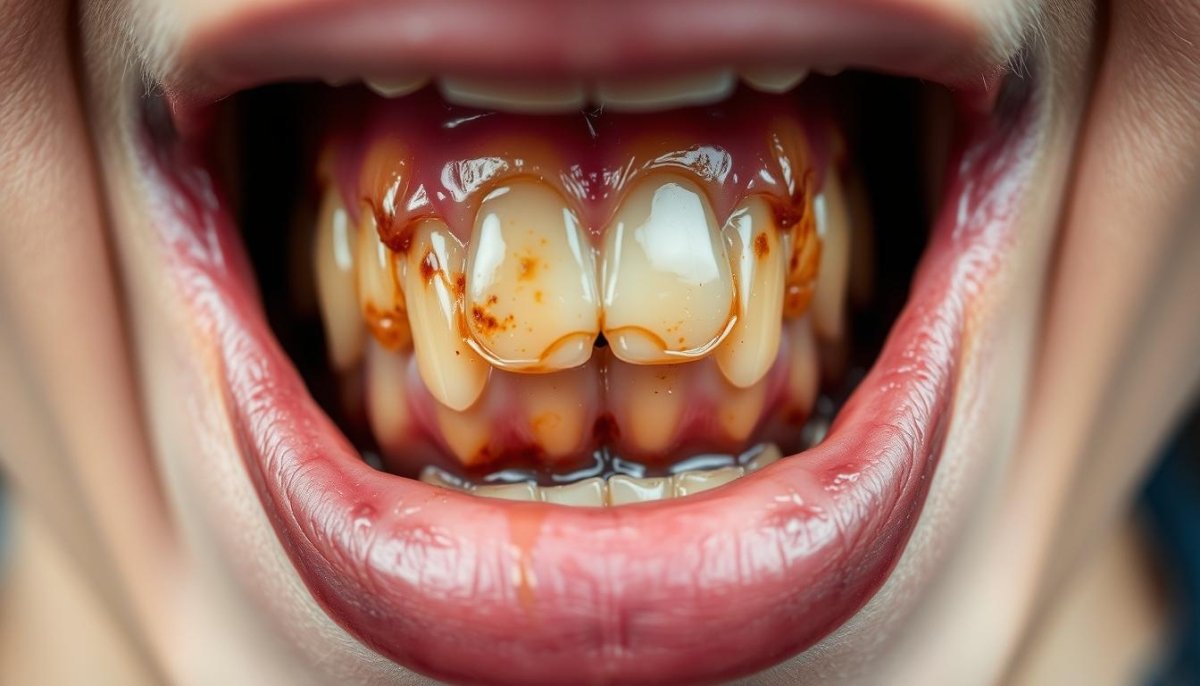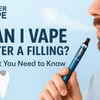Can Dentist Tell If You Vape: Signs Your Doctor Notices

Can Dentist Tell If You Vape: Signs Your Doctor Notices
Dental experts are getting better at spotting vaping signs during check-ups. They look for dry mouth, gum inflammation, and more. These signs show how vaping affects our teeth and gums.
Vaping affects our teeth and gums a lot. It makes our mouth dry, which can lead to cavities and gum disease. The chemicals in e-liquids can also hurt the mouth's tissues, causing problems.
Dentists are key in spotting vaping's effects on our mouths. They check our mouths closely. This helps them find vaping signs and offer the right treatment to protect our teeth and gums.
Key Takeaways
- Dentists can recognise the signs of vaping during routine check-ups, such as dry mouth, gum inflammation, and increased cavities.
- Vaping can reduce saliva flow, increasing the risk of tooth decay and gum disease.
- Dental professionals play a vital role in detecting and addressing vaping-related oral health issues.
- Regular dental check-ups and maintaining good oral hygiene are crucial for vapers to minimise the negative impact on their dental health.
- Disclosure of vaping habits to dentists can help them provide tailored treatment and guidance to improve oral health outcomes.
Introduction to Vaping and Dental Health
Vaping has become a popular choice instead of smoking. It's a way to get nicotine without smoking. But, vaping can harm your teeth and mouth. It's important to know how vaping affects your oral health to keep your smile bright.
Understanding Vaping
Vaping means breathing in vapour from e-cigarettes. These devices have a battery, heating element, and a cartridge with liquid. The liquid often has nicotine, propylene glycol, and flavourings. When heated, these turn into vapour that users inhale.
The Rise in Vaping Popularity
Recently, vaping has become more popular, especially among the young. Over 2.5 million middle school and high school students vaped in 2022. This rise worries experts about vaping's long-term effects, especially on teeth and mouth health.
Effects of Vaping on Overall Health
Research on vaping's long-term health effects is ongoing. Early studies point to risks for lung health and cell damage from flavourings. Also, one e-cigarette pod can have as much nicotine as 20 cigarettes. This shows vaping needs careful attention.
As vaping changes, knowing its effects on health is key. Understanding vaping helps people make better choices for their teeth and overall health.
Key Signs Dentists Look For
Dentists know how to spot signs that show someone might vape. They look for gum health changes. Vapers often get gum inflammation, redness, or swelling. These are early signs of vape effects on oral health.
They also check for tartar build-up. Tartar is a hard deposit on teeth. It forms because vaping dries out the mouth.
Staining on teeth is another sign. Nicotine and tar in vaping liquids cause stubborn stains. These stains need deep cleaning to remove.
Dentists can spot these stains during dental exams.
| Oral Health Indicator | Potential Link to Vaping |
|---|---|
| Gum Inflammation | Compounds in vaping products can irritate gum tissue, leading to redness and swelling. |
| Increased Tartar Build-up | Vaping can cause dry mouth, reducing saliva production and allowing tartar to accumulate more quickly. |
| Tooth Discolouration | Nicotine and tar in vaping liquids can stain teeth, leaving persistent discolouration. |
Dentists are skilled at finding vaping in mouth signs. They check gums, teeth, and oral hygiene. This helps them see if someone vapes and fix any dental problems.
Impact of Vaping on Oral Mucosa
Vaping is becoming more popular as a smoking alternative. It can harm the oral mucosa, the mouth's lining. Research shows that e-cigarettes' chemicals and aerosols can cause changes in the mouth. This might raise the risk of oral lesions and other health problems.
Alterations in the Lining of the Mouth
Vaping can harm the oral mucosa. Studies show that vape liquids' chemicals and flavorings can irritate and damage the mouth's tissues. This leads to vape stomatitis or "smoker's palate," causing sores or inflammation on the roof of the mouth.
Risk of Oral Lesions
Vaping also increases the risk of oral lesions, like canker sores. The vape aerosol's complex mix of chemicals can irritate and damage the mouth's tissues. This makes them more likely to develop lesions, affecting the mouth's appearance and comfort.
A recent survey in the UK found that teenage vaping has tripled in three years. The 2023 Action on Smoking and Health (ASH) survey showed a 50% increase in children trying vapes. This trend underlines the need to understand vaping's impact on oral health, especially among the young.
"The chemicals in vape aerosols can irritate and damage oral tissues, potentially leading to more serious oral health issues."
Halitosis and Its Link to Vaping
Vaping has become a popular choice instead of smoking. But, it comes with a worrying side effect: bad breath. This is often due to less saliva, a common vaping side effect. The chemicals in vape liquids can also cause bad smells in the mouth.
Understanding Bad Breath
Bad breath, or halitosis, affects many people. It can impact social and personal life. The rise of vaping has added a new factor to this problem.
Causes of Bad Breath in Vapers
- Dry Mouth: Vaping can reduce saliva, leading to dry mouth. Saliva helps keep the mouth healthy and fights off bad breath bacteria. Without enough saliva, these bacteria can cause bad breath.
- Chemical Composition: The chemicals in vape liquids, like propylene glycol and flavourings, can cause bad breath. These substances can stay in the mouth and mix with bacteria, creating foul smells.
Bad breath can be a sign of oral health problems. Vapers with this issue should see a dentist. They can help find the cause and improve dental health.
"Vaping has become increasingly popular, especially among young people, but the impact on oral health is not well understood. Halitosis is just one of the many dental concerns that dentists are seeing in their vaping patients."
The Role of Dental X-Rays
Dental X-rays are key in spotting vaping's impact on teeth and gums. They show early signs of jaw bone loss, which vaping might speed up. Dentists use X-rays to find cavities, gum disease, and other vaping-related dental issues. These problems are more common because vaping lowers saliva and causes dry mouth.
What X-Rays Reveal
Dental X-rays give dentists a detailed look at teeth, gums, and bones. They spot small changes that show vaping's effects on teeth. For instance, X-rays can find early bone loss around teeth, a problem seen more in vapers.
Identifying Bone Loss
- Dental X-rays can spot jaw bone loss from vaping.
- Bone loss can cause teeth to become unstable, gums to recede, and teeth to fall out if not treated.
- Spotting bone loss early with X-rays lets dentists plan treatments to stop further damage.
Regular dental X-rays help dentists keep an eye on vaping patients' teeth. This early detection lets dentists act fast to protect their patients' smiles.
"Dental X-rays are essential for detecting the early signs of bone loss and other vaping-related oral health issues. They allow us to provide our patients with the proper treatment and guidance to maintain a healthy smile."
The Connection Between Vaping and Tooth Decay
Vaping has become more popular, but it's worrying for our teeth. Dentists see a link between vaping and tooth decay. This link is complex and needs our attention.
Increased Risk Factors
Vaping can lead to tooth decay in several ways. E-cigarettes' vapour has nicotine, which can dry out our mouths. This dryness helps harmful bacteria grow, raising cavity risks.
Also, vape liquids often have sweeteners. These sweeteners help bacteria that cause cavities grow even more.
Understanding Cavities
Dentists see a pattern in patients who vape a lot. Vaping makes our mouths drier, perfect for bacteria to grow. This leads to more cavities.
The chemicals and flavourings in vape liquids also harm our teeth. They can weaken tooth enamel, making teeth more likely to decay.
It's important for vapers to see their dentist regularly. Catching problems early can help prevent bigger issues. Dentists can also teach patients about vaping risks and how to keep their teeth clean.
"Vaping can lead to a drier oral environment, promoting an increased incidence of cavities."
Dentists help patients understand the link between vaping and tooth decay. They encourage good oral hygiene. This includes brushing, flossing, and using fluoride products, especially for vapers.
How Vaping Affects Saliva Production
Vaping is becoming more popular, but it's affecting our oral health. It can lead to dry mouth, also known as xerostomia.
Importance of Saliva
Saliva is key for our oral health. It cleans away bacteria and acids. It also helps our taste buds and swallowing.
Without enough saliva, we face problems. These include tooth decay, gum disease, and trouble tasting, swallowing, and speaking.
Conditions Caused by Low Saliva Levels
- Increased risk of tooth decay and cavities due to the lack of saliva's antibacterial and buffering properties
- Heightened susceptibility to gum disease, as saliva helps flush away food particles and plaque
- Difficulty in tasting, swallowing, and speaking due to the reduced lubrication and moisture in the mouth
- Higher likelihood of developing oral infections and sores, such as candidiasis (thrush)
To fight dry mouth from vaping, dentists suggest certain products. These include saliva substitutes, sugar-free gum, or drinking more water.
| Condition | Prevalence in Vapers | Potential Impact |
|---|---|---|
| Tooth Decay | Increased risk | Cavities, tooth loss |
| Gum Disease | Heightened susceptibility | Inflammation, bleeding, bone loss |
| Oral Infections | Higher likelihood | Candidiasis, mouth sores |
Knowing how vaping affects saliva production helps vapers protect their oral health. They can tackle any vape mouth symptoms they face.
Recognising Vaping Devices
Vaping has become more popular over the last ten years. Dentists now know how to spot the different devices people use. They see everything from classic e-cigarettes to small pod systems. These devices can harm our teeth and gums.
It's important for dentists to know about the different vaping devices. They need to understand the flavours and ingredients too. This helps them give advice to keep teeth healthy.
Types of Devices Dentists May Identify
Dentists see many vaping devices during check-ups. Here are a few:
- E-cigarettes: These are the old-school vaping devices. They have a battery and a tank or cartridge that you can refill.
- Vape pens: These are small, pen-like devices. They often come with pre-filled or refillable cartridges.
- Pod systems: These are small, pod-like devices. They use sealed cartridges for easy use.
Common Flavours and Ingredients
Vaping liquids come in many flavours. Dentists can use these flavours to guess how often someone vapes. Fruit flavours and menthol can leave a smell in the mouth. Dentists might notice this during a check-up.
Dentists also know about the ingredients in vaping liquids. Things like propylene glycol and vegetable glycerin can affect our teeth and gums. Knowing this helps dentists give better advice on keeping teeth clean.
The Importance of Disclosure
It's key for vapers to tell their dentists about their habit. This honesty lets dentists give advice and plans that fit your needs. It also builds trust, making dental care more effective for vaping-related issues.
Why Patients Should Inform Their Dentist
Dentists aim to help, not judge. By sharing your vaping, you get care that's just for you. They can spot problems early, like gum disease or dry mouth, linked to vaping.
Building Trust in the Dental Relationship
Many fear being judged or worry about confidentiality. But, talking openly with your dentist is vital. They offer advice without judgment, helping you keep your mouth healthy.
| Reason for Disclosure | Benefit to the Patient |
|---|---|
| Tailored Advice and Treatment | Dentists can develop personalised care plans to address vaping-related oral health issues. |
| Early Detection of Problems | Dentists can identify signs of gum disease, tooth decay, and other problems linked to vaping. |
| Building Trust | Open communication helps establish trust and enables more effective interventions. |
Your dentist wants to help you keep your mouth healthy. By being honest about vaping, you and your dentist can work together. This ensures your teeth and gums stay healthy for the long term.
Educational Initiatives by Dentists
Dentists are key in teaching patients about vape effects on oral health. They offer helpful tips and info for those switching to oral hygiene for vapers. Many dental offices also help with quitting smoking and give advice on better oral care for vapers.
Raising Awareness Among Patients
Dentists know how vital it is to tell patients about vaping's risks. They talk about dangers like gum disease, cavities, and even oral cancer during visits. This helps patients make better choices for their health.
Resources for Smoking Cessation
Dentists also help those wanting to quit smoking or vaping. They might suggest quitting programs, give out educational materials, or recommend nicotine replacement. Working together, dentists and patients can overcome quitting challenges and improve health.
Research shows vaping users face a higher risk of gum disease and infections. Vaping can also harm health in many ways, including heart problems and oral cancer.
"Vaping with nicotine can result in teeth staining comparable to the effects of smoking, and e-cigarettes are suggested to cause gum recession, gum damage, tooth loss, and gum disease."
Dentists work hard to educate and support their patients. They aim to help maintain good oral hygiene for vapers and reduce vape effects on oral health.
Professional Recommendations for Vapers
Dentists are now more careful in spotting vaping habits. They tell vapers about the best ways to keep their teeth and mouth healthy.
Best Oral Hygiene Practices
Vapers should brush their teeth often, at least twice a day. Flossing is also key to stop gum disease and tooth decay. Using mouthwash without alcohol helps keep the mouth moist.
Chewing sugar-free gum is good too. It makes saliva, which helps protect teeth from acid and decay.
Regular Check-Ups Importance
Going to the dentist every six months is vital for vapers. These visits help dentists catch any health problems early. They might suggest treatments like fluoride to prevent cavities.
By taking care of their teeth, vapers can avoid future problems. This keeps their smile healthy and confident.
| Oral Hygiene Recommendation | Frequency | Purpose |
|---|---|---|
| Brushing | Twice daily | Remove plaque and food particles |
| Flossing | Daily | Prevent gum disease and tooth decay |
| Alcohol-free mouthwash | As needed | Combat drying effects of vaping |
| Sugar-free gum | As needed | Stimulate saliva production |
| Dental check-ups | Every 6 months | Monitor oral health and address issues early |
Following these tips, vapers can keep their teeth and mouth healthy. This helps reduce vaping's bad effects on their dental health.
Comparing Vaping and Traditional Smoking
Vaping is seen as a safer choice than smoking, but it's not without risks. Both can harm your teeth, gums, and mouth.
Similarities and Differences
Vaping can cause dry mouth, just like smoking. This can lead to gum disease, tooth decay, and bad breath. Both can also increase the risk of periodontal diseases, which can cause tooth loss.
However, vaping might stain teeth less than smoking. But, vaping can still cause tooth discolouration, especially with flavoured e-liquids.
Implications for Dental Health
Research on vaping's effects on oral health is ongoing. Some studies say vaping is safer than smoking, but others show it can still harm teeth and gums.
It's important for both smokers and vapers to see the dentist regularly. Good oral hygiene, like brushing and flossing, can help protect your teeth and gums.
"Vaping may not cause the same level of tooth staining as smoking, but it can still lead to discolouration and other oral health issues."
What to Expect During Your Dental Visit
When you visit the dentist, they might ask about your vaping habits. This helps them check your oral health better. They look for signs of vaping that could harm your teeth and gums.
Questions Your Dentist May Ask
Your dentist will ask about how often and for how long you vape. They want to know what products you use. They might also ask if you've noticed any changes in your mouth, like sensitivity or discolouration.
Telling your dentist the truth about vaping is important. It helps them give you the best care.
Evaluating Your Oral Health
Your dentist will examine your mouth for vaping-related problems. They might use special tools to check your gums and teeth. Signs like dry mouth or gum inflammation could mean vaping is affecting your health.
Understanding vaping's impact on your mouth is key. Your dentist can then offer advice to keep your mouth healthy. Regular visits and talking openly with your dentist are essential for good oral health.
"Vaping can cause a range of oral health issues, from dry mouth and gum inflammation to an increased risk of tooth decay and oral lesions. It's important to be upfront with your dentist about your vaping habits so they can properly assess and address any concerns."
| Potential Oral Health Issues from Vaping | Prevalence |
|---|---|
| Dry mouth | 90% of vapers |
| Gum inflammation | 60% of vapers |
| Tooth discolouration | 80% of vapers |
| Increased risk of cavities | 50% of vapers |
| Oral lesions | 30% of vapers |
Consequences of Ignoring Dental Issues from Vaping
Vaping has become more popular, especially among teens. This has raised concerns about its impact on oral health. If you ignore dental problems caused by vaping, it can harm your teeth and gums. It can also affect your wallet.
Long-Term Effects on Teeth and Gums
Ignoring vaping-related dental issues can lead to serious gum disease. This can cause bone loss and tooth loss. Vape liquids contain harmful chemicals that increase the risk of oral cancer.
- Gum inflammation and recession
- Increased risk of oral lesions and sores
- Heightened susceptibility to tooth decay and cavities
- Potential for tooth loss due to weakened bone structure
Financial Implications of Neglect
Ignoring dental problems from vaping can be very expensive. Treatments like gum disease therapy and tooth extractions can cost a lot. Trying to fix oral health after neglecting it can lead to even more costly procedures.
| Treatment | Average Cost (UK) |
|---|---|
| Gum Disease Therapy | £500 - £3,000 |
| Tooth Extraction | £50 - £500 |
| Dental Implant | £2,000 - £6,000 |
Seeing a dentist regularly is key for vapers to keep their teeth and gums healthy. This can prevent expensive treatments and protect your oral and financial health in the long run.
Conclusion: The Importance of Oral Health Monitoring
Regular checks on your mouth health are key if you vape. Dentists help spot problems early and give tips on keeping your mouth clean. Talking openly with your dentist is crucial for managing any dental issues vaping might cause.
Encouraging Open Communication with Dentists
Tell your dentist if you vape. This helps them give you the right advice to prevent problems. A good relationship with your dentist means they can help you understand vaping's impact on your teeth and gums.
Making Informed Choices for Your Health
Knowing the risks of vaping and taking steps to protect your mouth is important. Dentists can guide you on how to keep your mouth healthy. By following their advice and getting regular check-ups, you can look after your overall health.
FAQ
Can dentists tell if you vape?
Yes, dentists can spot signs of vaping during check-ups. They look for dry mouth, gum inflammation, more cavities, and changes in the mouth's tissues.
What are the effects of vaping on oral health?
Vaping can lead to dry mouth, which raises the risk of tooth decay and gum disease. It also causes gum inflammation and changes in the mouth's lining.
What signs do dentists look for to detect vaping?
Dentists check for gum inflammation, more tartar, tooth staining, and gum health changes. They look for receding gums or signs of gum disease.
How does vaping affect the oral mucosa?
Vaping can alter the mouth's lining, causing conditions like vape stomatitis or smoker's palate. It also raises the risk of oral lesions, including canker sores.
Is there a link between vaping and halitosis (bad breath)?
Yes, vaping can cause bad breath due to dry mouth and the chemicals in vape liquids. These can lead to unpleasant odours.
What role do dental X-rays play in detecting vaping-related issues?
Dental X-rays show early jaw bone loss and help spot cavities and dental problems common in vapers.
How does vaping increase the risk of tooth decay?
Vaping lowers saliva production, allowing bacteria to grow. The sweeteners in vape liquids also increase cavity risk.
How does vaping affect saliva production?
Vaping greatly reduces saliva production, causing dry mouth or xerostomia. This increases the risk of tooth decay, gum disease, and problems with tasting, swallowing, and speaking.
What types of vaping devices do dentists recognise?
Dentists know about e-cigarettes, vape pens, and pod systems. They may also detect the chemical scent of vape liquids during exams.
Why is it important for patients to disclose their vaping habits to dentists?
Telling dentists about vaping helps them give better advice and treatment. It builds trust and ensures effective care.
What role do dentists play in educating patients about the risks of vaping?
Dentists share information on smoking cessation, including vaping. They offer tips on oral hygiene for vapers.
What oral hygiene practices do dentists recommend for vapers?
Dentists suggest brushing and flossing more often. They recommend using alcohol-free mouthwash, chewing sugar-free gum, and regular dental visits.
How do the oral health effects of vaping compare to traditional smoking?
Both vaping and smoking can cause dry mouth, gum disease, and oral cancers. However, vaping may not stain teeth as much as smoking.
What can patients expect during a dental visit related to vaping?
Dentists may ask about vaping and perform a detailed oral exam. They check for signs of dry mouth, gum inflammation, cavities, and oral lesions. They use special tools to assess overall health.
What are the long-term consequences of ignoring vaping-related dental issues?
Ignoring vaping-related dental issues can lead to severe gum disease, tooth loss, and oral cancer risk. This can also be costly for extensive dental treatments.






